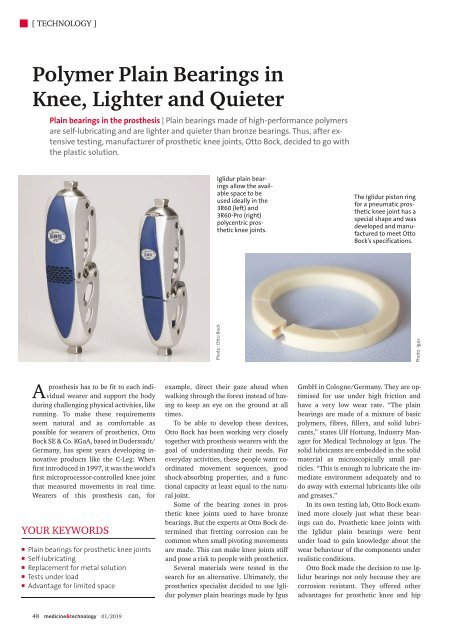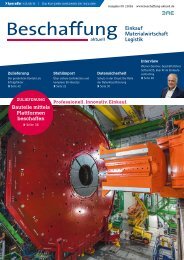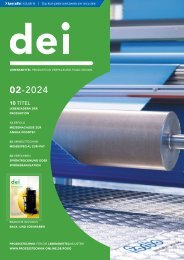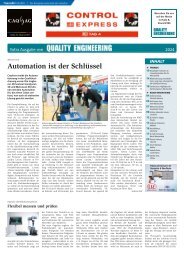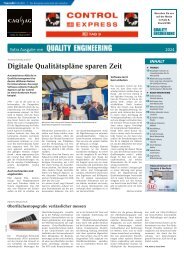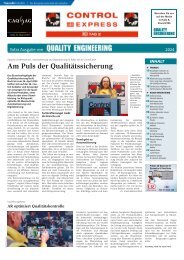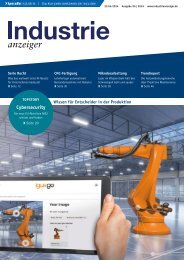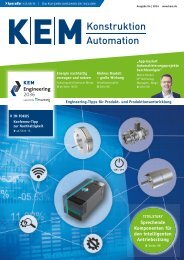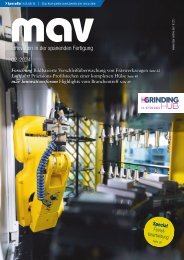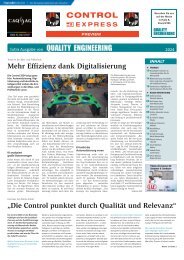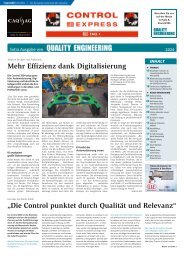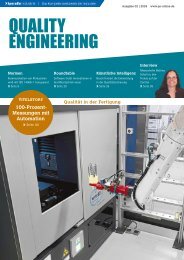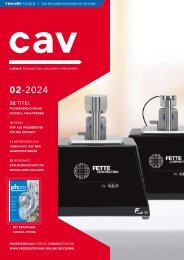medicine&technology 01.2019
Create successful ePaper yourself
Turn your PDF publications into a flip-book with our unique Google optimized e-Paper software.
■ [ TECHNOLOGY ]<br />
Polymer Plain Bearings in<br />
Knee, Lighter and Quieter<br />
Plain bearings in the prosthesis | Plain bearings made of high-performance polymers<br />
are self-lubricating and are lighter and quieter than bronze bearings. Thus, after extensive<br />
testing, manufacturer of prosthetic knee joints, Otto Bock, decided to go with<br />
the plastic solution.<br />
Iglidur plain bearings<br />
allow the available<br />
space to be<br />
used ideally in the<br />
3R60 (left) and<br />
3R60-Pro (right)<br />
polycentric prosthetic<br />
knee joints.<br />
The Iglidur piston ring<br />
for a pneumatic prosthetic<br />
knee joint has a<br />
special shape and was<br />
developed and manufactured<br />
to meet Otto<br />
Bock’s specifications.<br />
Photo: Otto Bock<br />
Photo: Igus<br />
A<br />
prosthesis has to be fit to each individual<br />
wearer and support the body<br />
during challenging physical activities, like<br />
running. To make these requirements<br />
seem natural and as comfortable as<br />
possible for wearers of prosthetics, Otto<br />
Bock SE & Co. KGaA, based in Duderstadt/<br />
Germany, has spent years developing innovative<br />
products like the C-Leg: When<br />
first introduced in 1997, it was the world’s<br />
first microprocessor-controlled knee joint<br />
that measured movements in real time.<br />
Wearers of this prosthesis can, for<br />
YOUR KEYWORDS<br />
■<br />
■<br />
■<br />
■<br />
■<br />
Plain bearings for prosthetic knee joints<br />
Self-lubricating<br />
Replacement for metal solution<br />
Tests under load<br />
Advantage for limited space<br />
example, direct their gaze ahead when<br />
walking through the forest instead of having<br />
to keep an eye on the ground at all<br />
times.<br />
To be able to develop these devices,<br />
Otto Bock has been working very closely<br />
together with prosthesis wearers with the<br />
goal of understanding their needs. For<br />
everyday activities, these people want coordinated<br />
movement sequences, good<br />
shock-absorbing properties, and a functional<br />
capacity at least equal to the natural<br />
joint.<br />
Some of the bearing zones in prosthetic<br />
knee joints used to have bronze<br />
bearings. But the experts at Otto Bock determined<br />
that fretting corrosion can be<br />
common when small pivoting movements<br />
are made. This can make knee joints stiff<br />
and pose a risk to people with prosthetics.<br />
Several materials were tested in the<br />
search for an alternative. Ultimately, the<br />
prosthetics specialist decided to use Iglidur<br />
polymer plain bearings made by Igus<br />
GmbH in Cologne/Germany. They are optimised<br />
for use under high friction and<br />
have a very low wear rate. “The plain<br />
bearings are made of a mixture of basic<br />
polymers, fibres, fillers, and solid lubricants,”<br />
states Ulf Hottung, Industry Manager<br />
for Medical Technology at Igus. The<br />
solid lubricants are embedded in the solid<br />
material as microscopically small particles.<br />
“This is enough to lubricate the immediate<br />
environment adequately and to<br />
do away with external lubricants like oils<br />
and greases.”<br />
In its own testing lab, Otto Bock examined<br />
more closely just what these bearings<br />
can do. Prosthetic knee joints with<br />
the Iglidur plain bearings were bent<br />
under load to gain knowledge about the<br />
wear behaviour of the components under<br />
realistic conditions.<br />
Otto Bock made the decision to use Iglidur<br />
bearings not only because they are<br />
corrosion resistant. They offered other<br />
advantages for prosthetic knee and hip<br />
48 medicine&<strong>technology</strong> 01/2019


